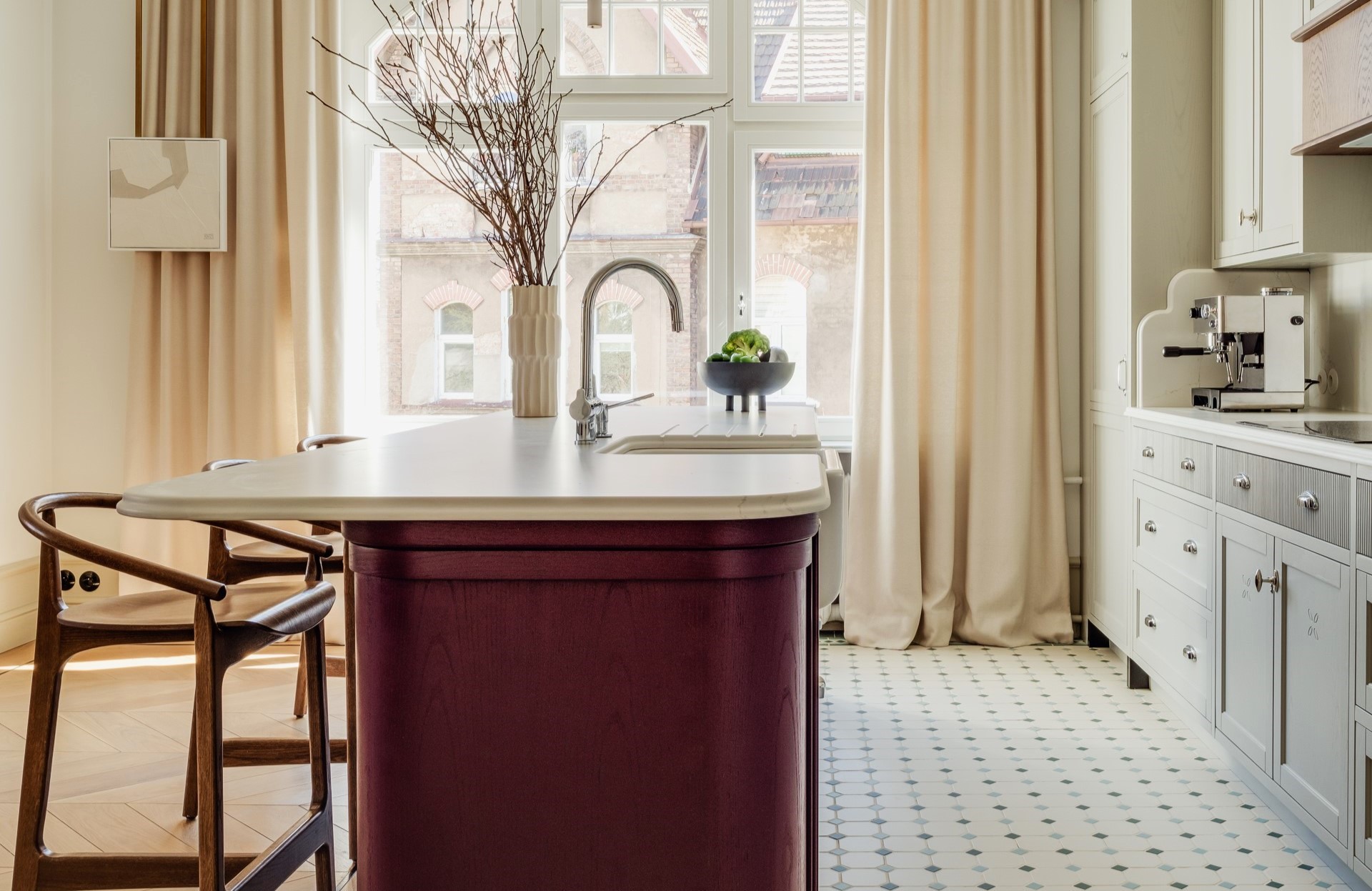
Among the myriad considerations you need to make for a small kitchen, the design and flooring are definitely up there with some of the most crucial. A cleverly chosen floor tile can make a huge impact on your kitchen's aesthetic and practicality and, most importantly — particularly in the case of small kitchens — can help make a space look bigger.
When it comes to small kitchen floor ideas, you want to ensure the tiles enhance or streamline the space, making it feel open, inviting, and practical. Too busy a pattern, and your kitchen can feel smaller and suffocating. Then again, sticking with bright white tiles may magnify every spill and stain.
If you're not sure what colors, patterns, designs and styles would best suit your space, then take a look at these expert-approved kitchen tile ideas for small kitchens to help you make your decision.
1. Go for dark tiles

Dark tiles in a small kitchen? It may sound counterproductive but this is a great design idea. Some of the best floor tiles for small kitchens are the dark ones as they easily hide stains, spills, and messes; and porcelain tiles, known to be super durable will ensure your small space is long-lasting, robust, and easy to maintain.
"I chose a 12x24 porcelain tile called Aqua Nero from The Tile Shop," shares designer Rashida Banks. "Instead of laying it in a typical offset layout, I decided to have the tile laid out in a herringbone pattern because we have a galley kitchen, and I wanted to give some visual direction towards the entry door or the refrigerator, depending on where you are standing. The tile has a matte finish and a very believable natural stone look with all the benefits of porcelain."
It was the color of the tiles that hooked Rashida the most. "Although it appears black, it's more of a blueberry shade," she adds. "If you place a blueberry on the ground, it fades into the flooring. The dusty look helps hide dog hair from our two pups that shed constantly. Three years later, I'm still really happy with my flooring decision."
2. Create a warmth with herringbone floors
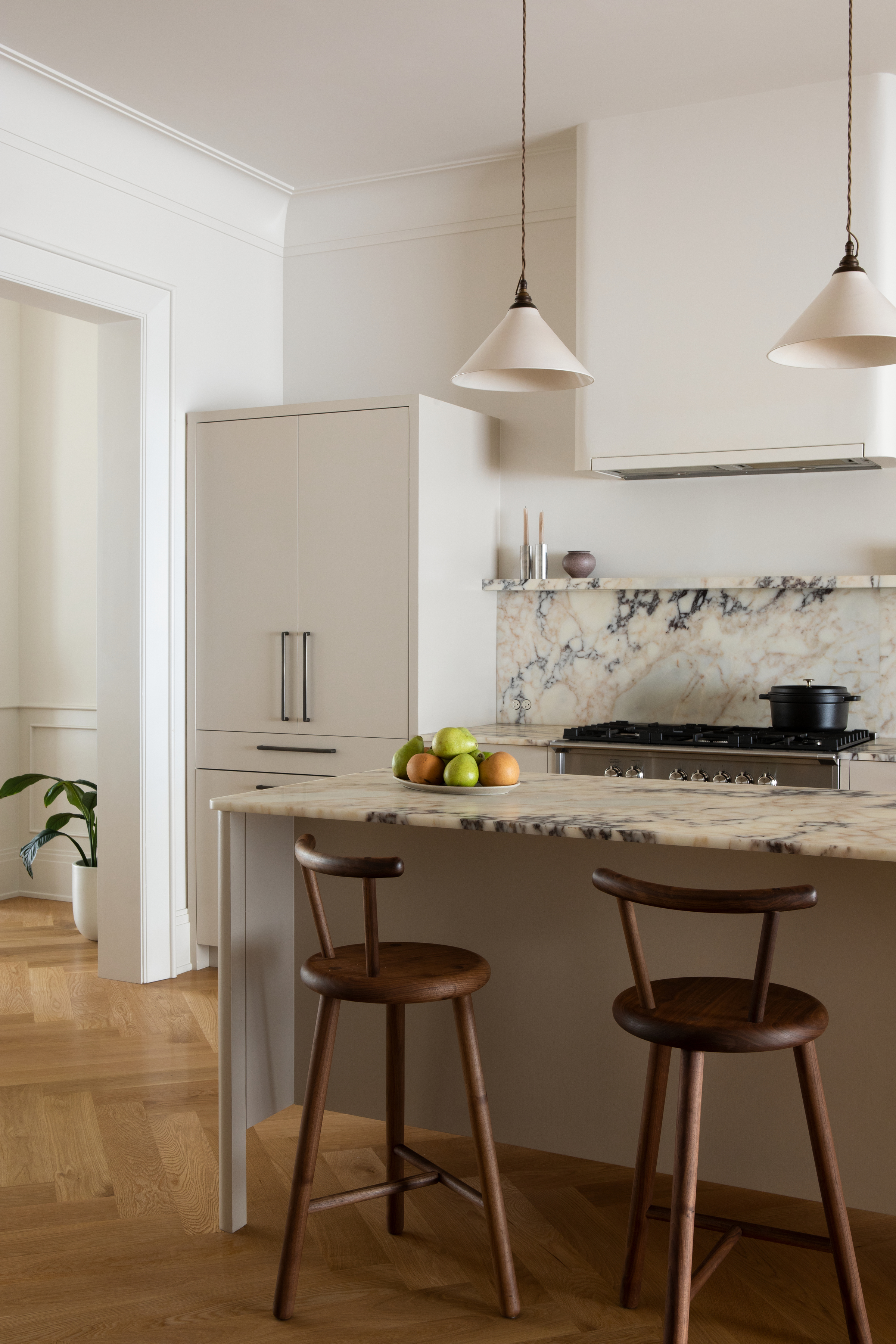
Go tiles for your kitchen flooring that make the room feel inviting to work in. After all, a small kitchen might not always be an easy space to move around in, especially if there's more than one cook. Wood kitchen flooring is instantly appealing, long-lasting, and fits a variety of budgets.
"On the parlor floor we installed white oak herringbone floors," says Lindsey Branca of Branca and Co. "It felt appropriate to the history of the house on this floor and added warmth to spaces. The kitchen is at the center of the parlor floor through a grand arched opening from the hall. This room was imagined as being the main gathering spot for the family, so placing it at the physical center of the house felt right."
3. Opt for patterned tiles to add whimsy
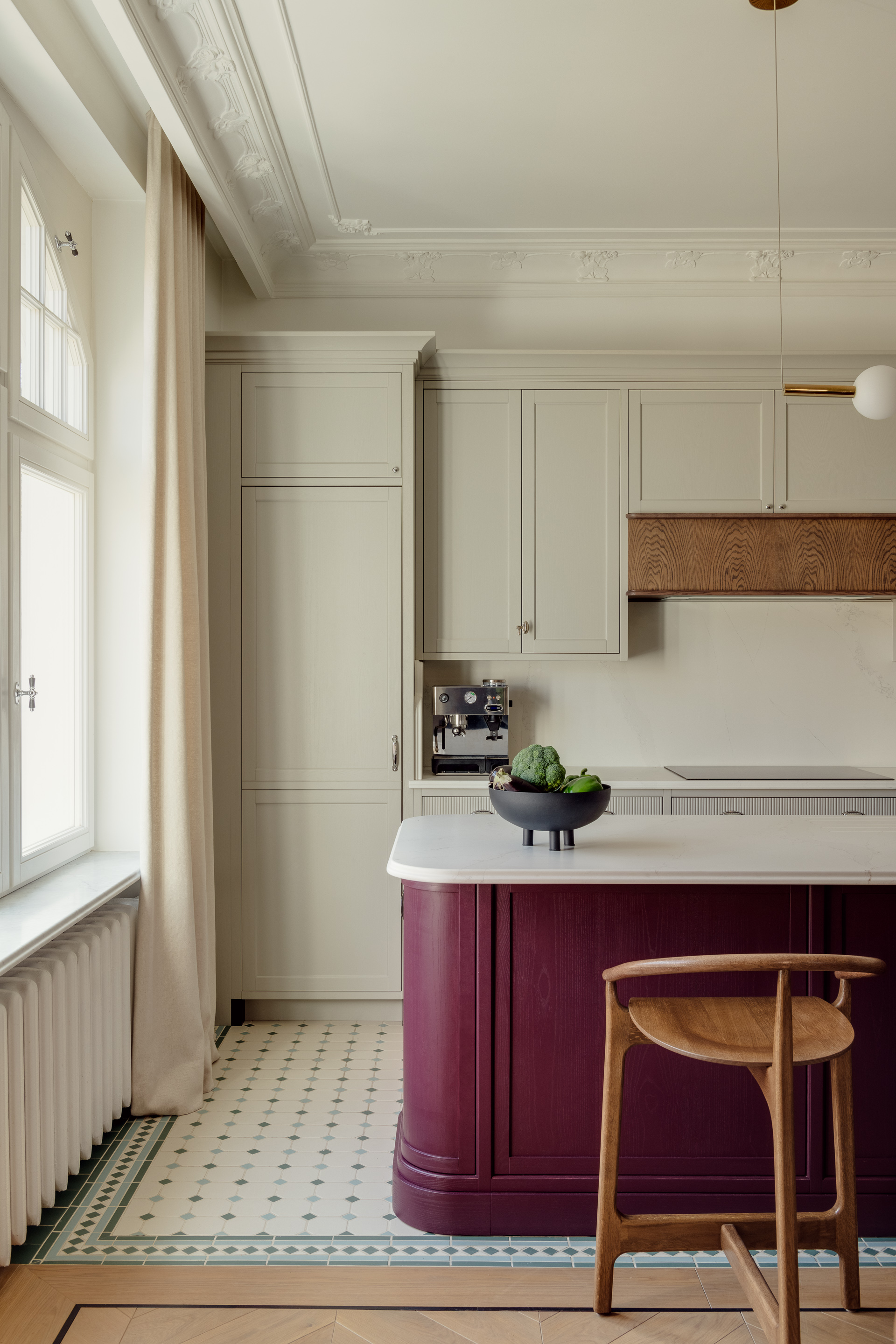
Kitchen floor tiles can be the distraction you need in your small modern kitchen. Opt for printed or hand-painted ceramic tiles that not only add color to the room but also movement to the scheme. This is a great way to inject eclecticism, contrast, and intrigue into the space.
Ceramic tiles are an especially good choice because they hold up well to heavy traffic, and the colorful choices available can make a rug optional (although if you do decide to add a kitchen rug, ensure it has a rug pad underneath).
4. Lay out natural stone tiles
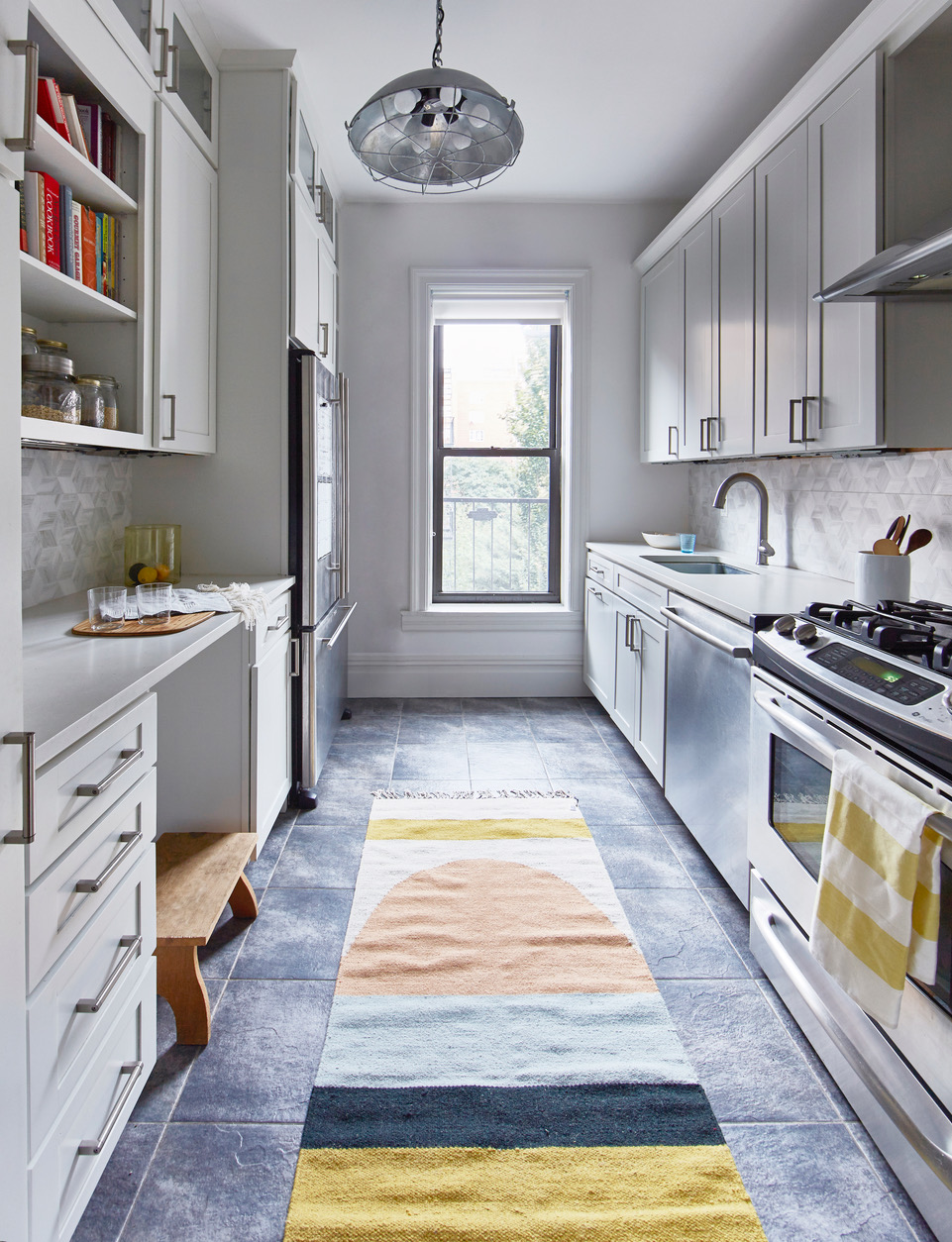
Natural stone is among the best floor tiles for small kitchens as they have enduring beauty and warmth. While marble is a common choice, you could even go for stone flooring for the kitchen; or slate tiles. These are hard, strong, and durable, and can withstand kitchen traffic and accidents without breaking or chipping.
Price-wise, natural stones can vary greatly but larger-format tiles are usually less expensive than smaller tiles.
5. Choose a zig-zag formation to zone an open-plan space
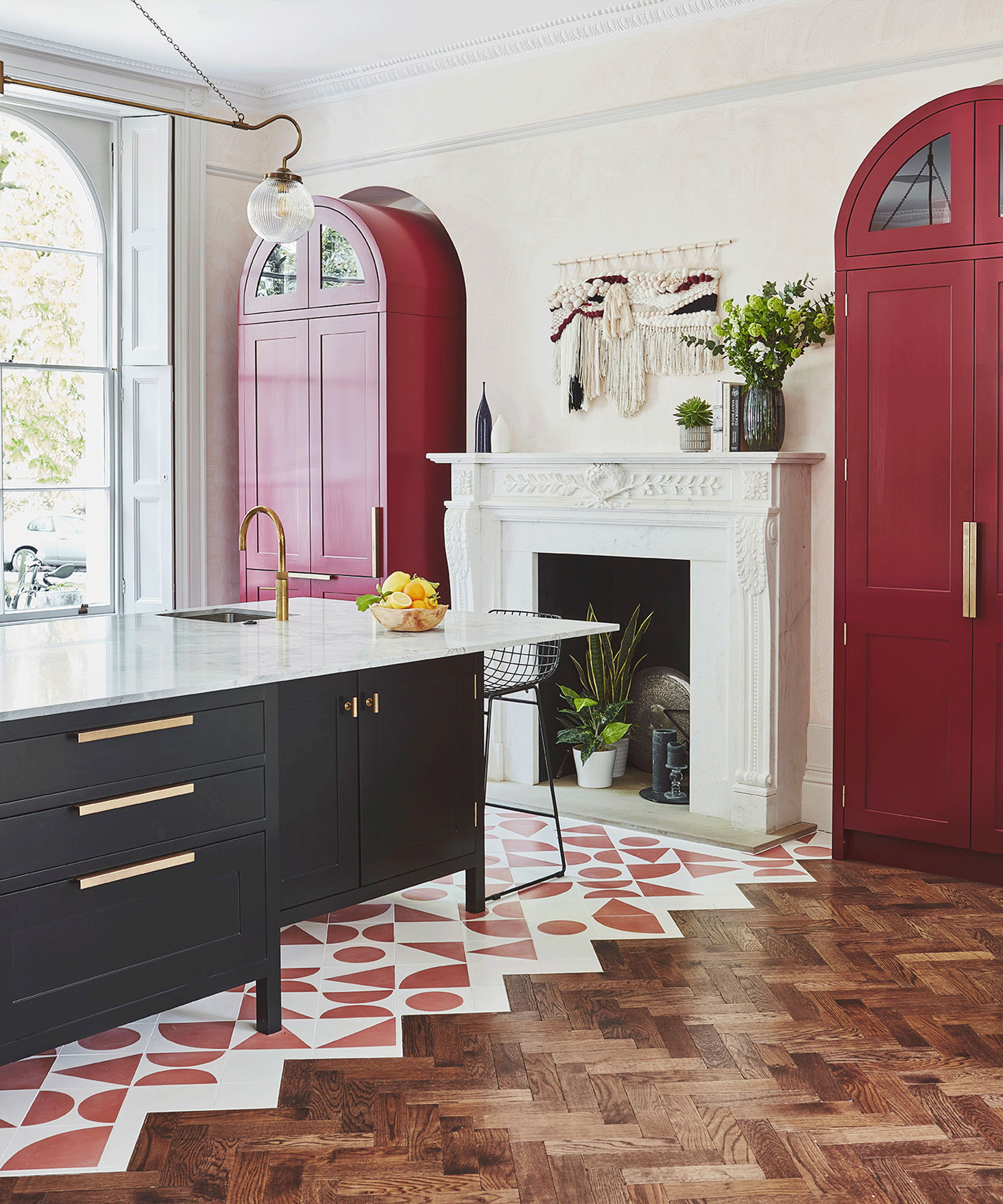
Zoning is particularly important in small kitchen layouts as it is sometimes visually harder to clearly define different areas. This is where clever tile ideas come in.
"For example, in open plan living spaces where the kitchen shares a continuous floor with a living or dining space, an interesting solution to this is to use timber flooring or even a porcelain effect timber tile in the living spaces and then transition to a bolder more exciting tile in the kitchen space," says Oana Sandu, lead designer of interiors studio Blakes London. In this project by Blakes London, a zig-zag formation tile is used to highlight the kitchen space which plays into the timber flooring in the living area.
"The options are pretty endless, hence why adding tiles to your kitchen is always a guaranteed way to add personality to your home," says Oana. "Once you've chosen your tile, don't forget to pay every bit of attention to your choice of grout color as this can change the look and feel of a tile layout in an instant."
6. Choose a large format tile to minimise grout lines
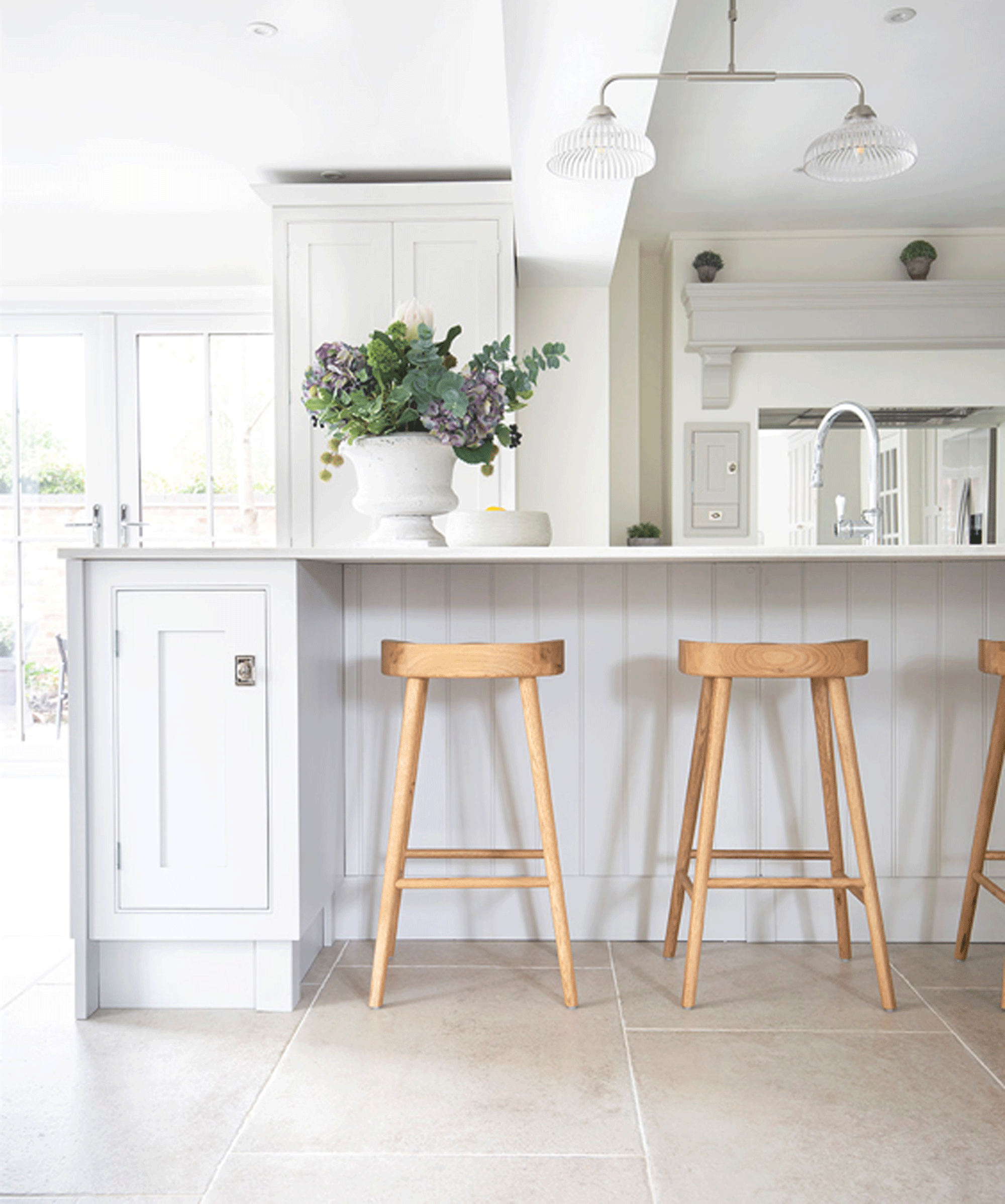
Lots of grout lines can draw attention to the floor of a small kitchen and can visually restrict the floor space. The answer? Large-format tiles.
"With state-of-the-art machinery advancements, large format porcelain is becoming an on-trend and popular tile size to choose," says Isabel Fernandez, director at Quorn Stone. "Stone effect porcelain is most commonly in 900×600 or 800×800 tile sizes, but recently 1200×600 super-size porcelain tiles have become available and really do make the perfect addition for a stunning kitchen floor space."
A large format tile helps minimize grout lines and maximize the focus on each tile. A great way to make a small kitchen look bigger is the way you lay out the tiles. "For narrow spaces, widthways will make the space appear wider," shares Isabel. "For shorter spaces, lengthways will make a kitchen appear longer. Your eyes will naturally always follow the line of the tiles."
7. Consider painting your tiles for a unique look
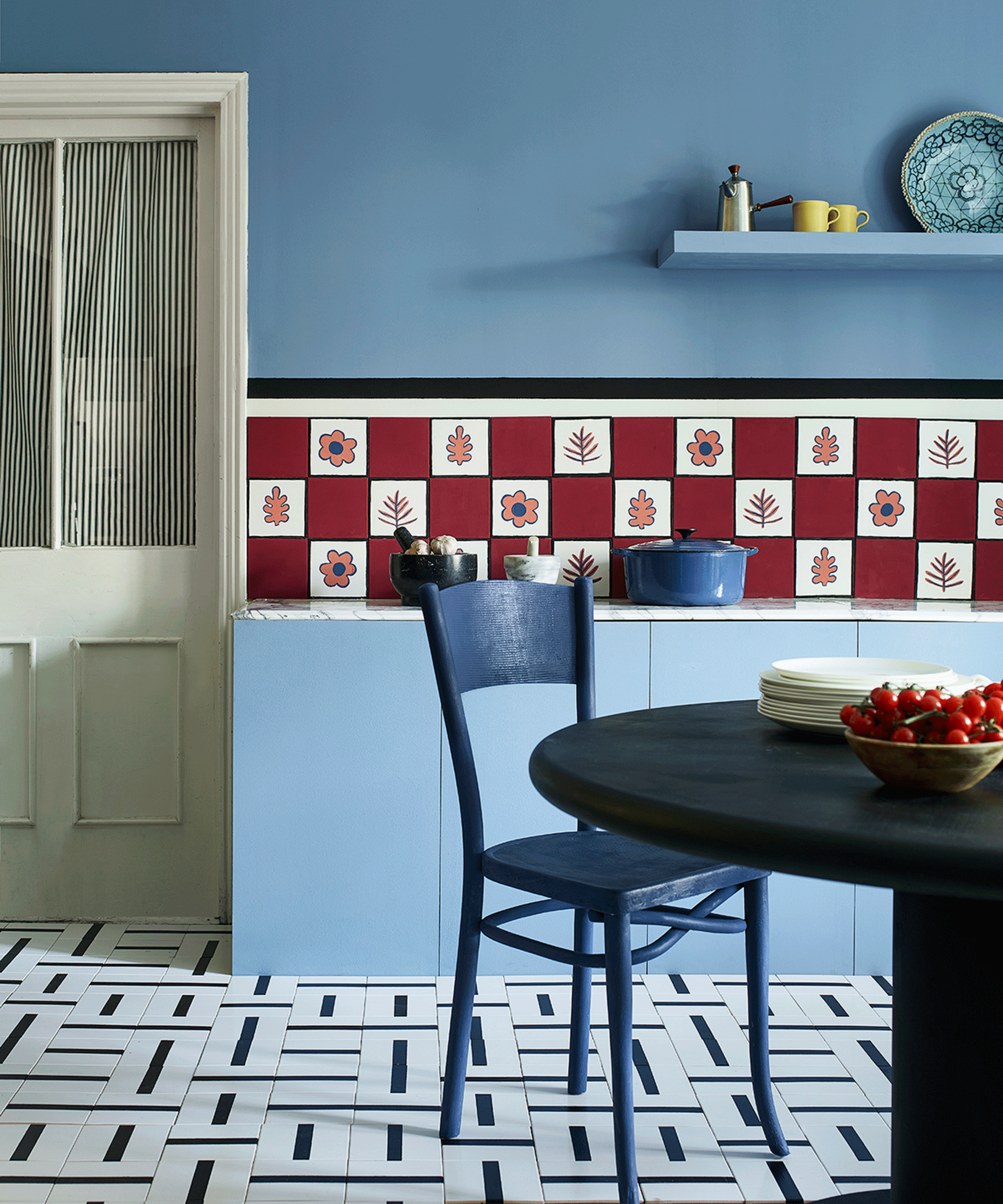
In a kitchen where space is limited, it is important to let every element sing, including the floor. One option is to update your kitchen color scheme and paint your tiles to get an individual design or you can use paint to refresh existing tiles for a quick and affordable revamp.
"You can paint your tiles for a fraction of the cost of shop-bought," says color and paint expert Annie Sloan. "The only skills you need are patience, imagination, and forward planning."
"In this kitchen, the floor tiles were covered in masking tape, with only a strip left exposed, which we painted black," adds Annie. "When dry, we positioned on the floor in alternate directions for a simple yet graphic look."
It is important to factor in the time and patience that the painting will require so you can get the best results. "It’s always better to paint in an area you can avoid completely whilst everything dries, probably about 48 hours.," adds Annie. "Tiled surfaces need to be given plenty of drying time between coats and before lacquering. If you can’t do a whole floor, do a half at a time. Patience and painting go hand in hand: the more care you take whilst painting, the less likely you are to make mistakes."
8. Choose a penny tile to create subtle pattern
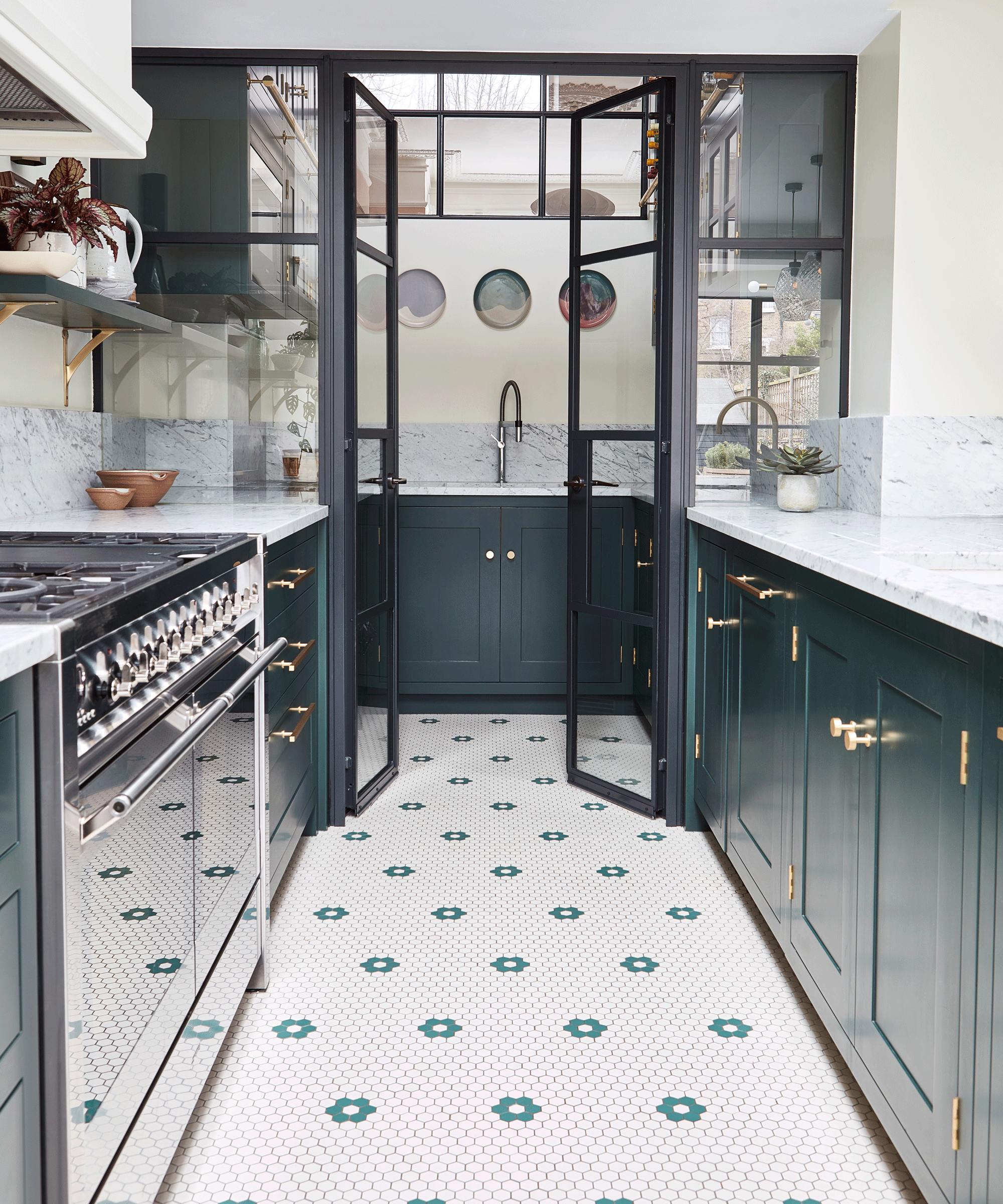
Penny tiles are some of the best floor tiles for small kitchens; in fact, these are a big interior design trend because they fit both modern and traditional interior schemes. Magnus Nilsson, lead designer at Blakes London agrees. "The penny tile is a fabulously versatile little creature and as such can be put to work in almost any scheme. Its ability to be expressed in a multitude of different ways makes it a popular choice for many homes."
A plain tile with a matching grout color offers a clean simple look and feel while still bringing texture and interest to a scheme. "Change up the grout color to something more contrasting, and immediately you create a different look and feel," says Magnus.
"Penny tiles are perfect for spaces where you may wish to add text to the floor," adds Magnus. "A simple hello in an "entryway" or a jovial "splash" written in a bright color on the floor of a kid's bathroom can be hugely impactful."
9. Match the tiles with the color of the walls
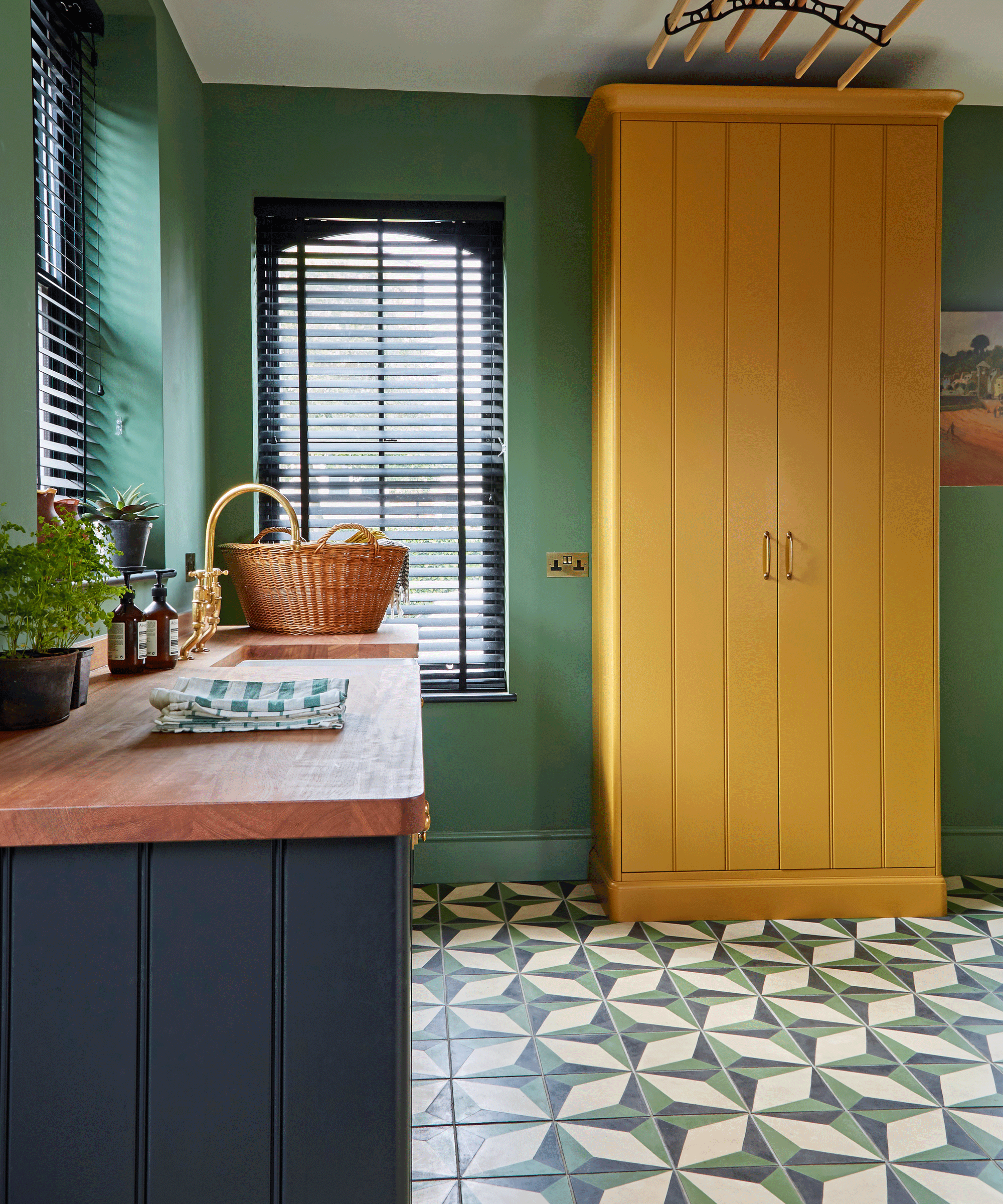
A patterned kitchen tile can bring a dash of color to a small kitchen but it doesn’t need to be in isolation. To choose the right tile, take your starting point from kitchen wall paint colors like in this project by Forbes Rix Design.
These dynamic Alvito floor tiles from Fired Earth pick up on Farrow & Ball’s Calke Green which is painted on the walls, and the Off Black base units. The tiles help pull the whole look together and are more pleasing to the eye, while also distracting from the size of the kitchen. "We recommend a maximum of three colors to keep it from becoming too busy," says Natalie Forbes of Forbes Rix Design.
10. Choose a porcelain tile for a durable, stain-proof option
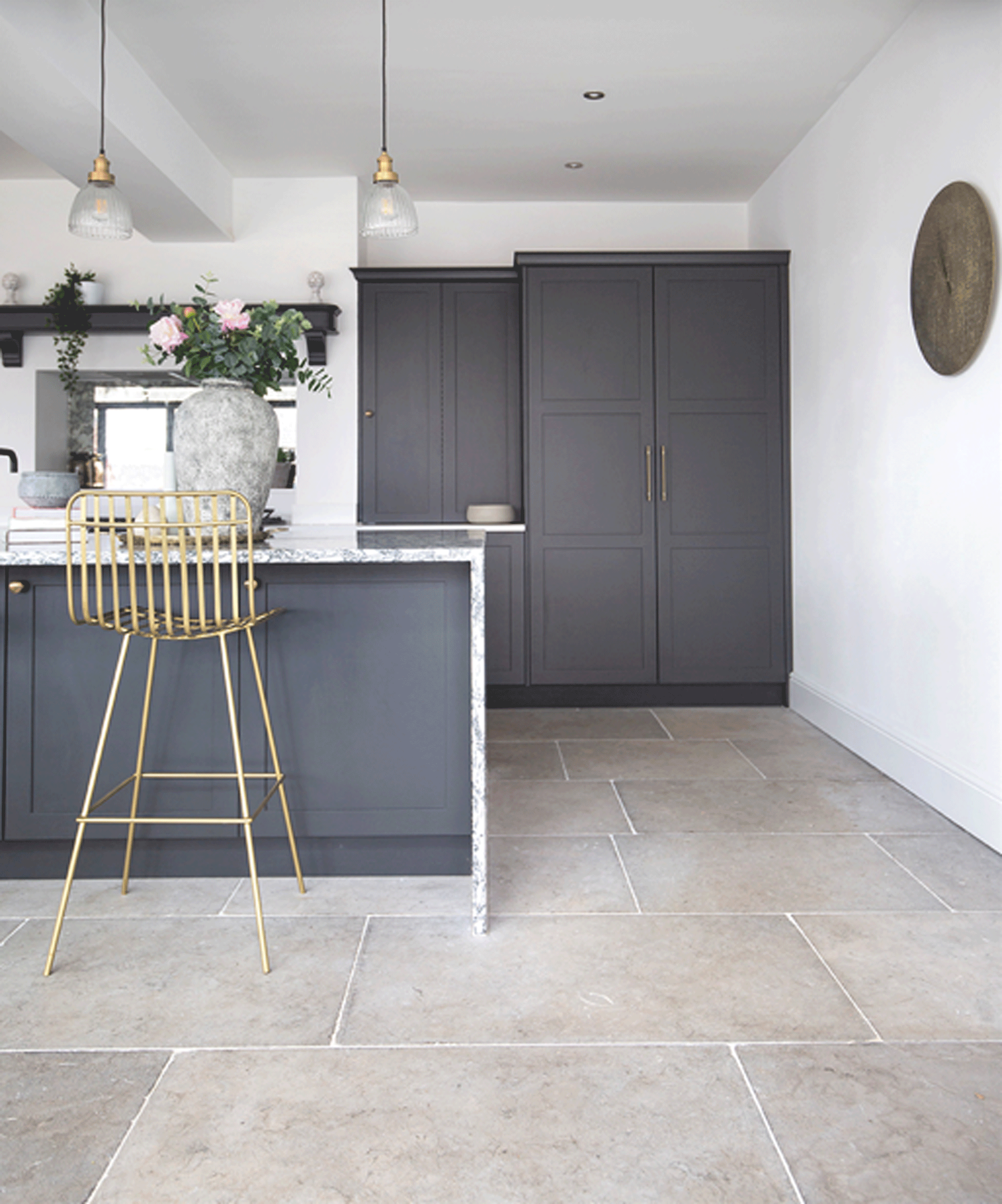
For fuss-free flooring in a small kitchen, porcelain tiles are the way to go. They are extremely durable and easy to wipe clean and can come in a variety of colors and styles. As they are so hard-wearing they are particularly suited for areas of high traffic like hallways and kitchens that need a slightly rustic touch.
"Stone effect porcelain has come a long way in recent years and the designs produced in Italy and Spain are second to none and extremely uncanny to a stone," says Isabel Fernandez of Quorn Stone. "A porcelain tile is non-porous and will therefore provide a stain-proof option which can be preferable with young children!"
11. Add some luxe with marble
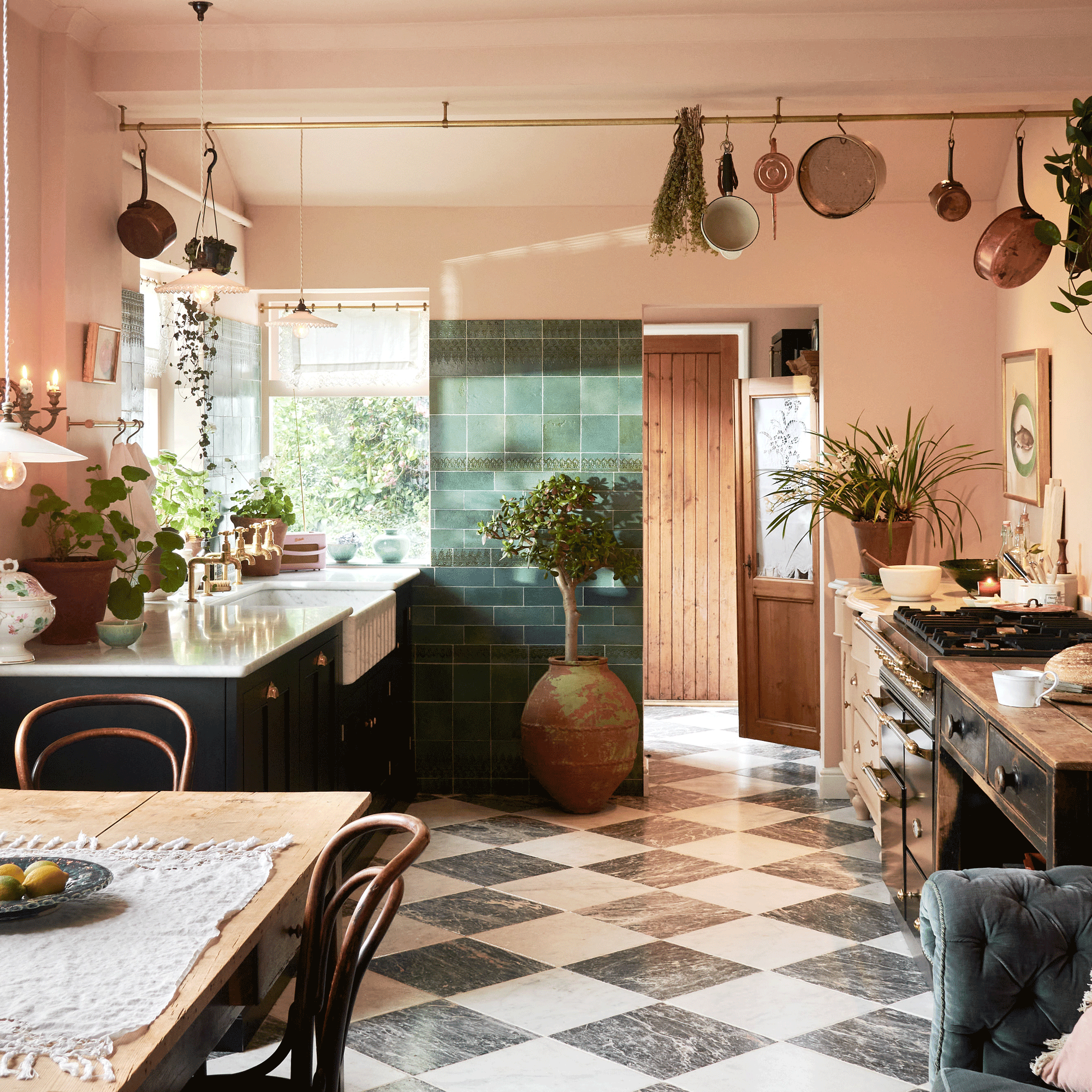
For a feeling of luxury, you can’t pick better than marble. Marble does not come cheap, but in a small space, the cost becomes easier to justify. The flooring in this marble kitchen by deVOL feels opulent but gives a vintage feel to the design, elevating the simple wooden cabinetry.
"I settled on a chequered marble floor by Floors of Stone, this gave me the perfect base, it felt Victorian, grand, and slightly faded. It’s not the cheapest floor but it is a place worth spending your money, in my opinion," says Helen Parker, deVOL's creative director. "Tiny flecks of pink within the marble were beautifully similar to my favorite Farrow and Ball's Setting Plaster, so the walls were now decided on too."
12. Incorporate terrazzo for color and pattern
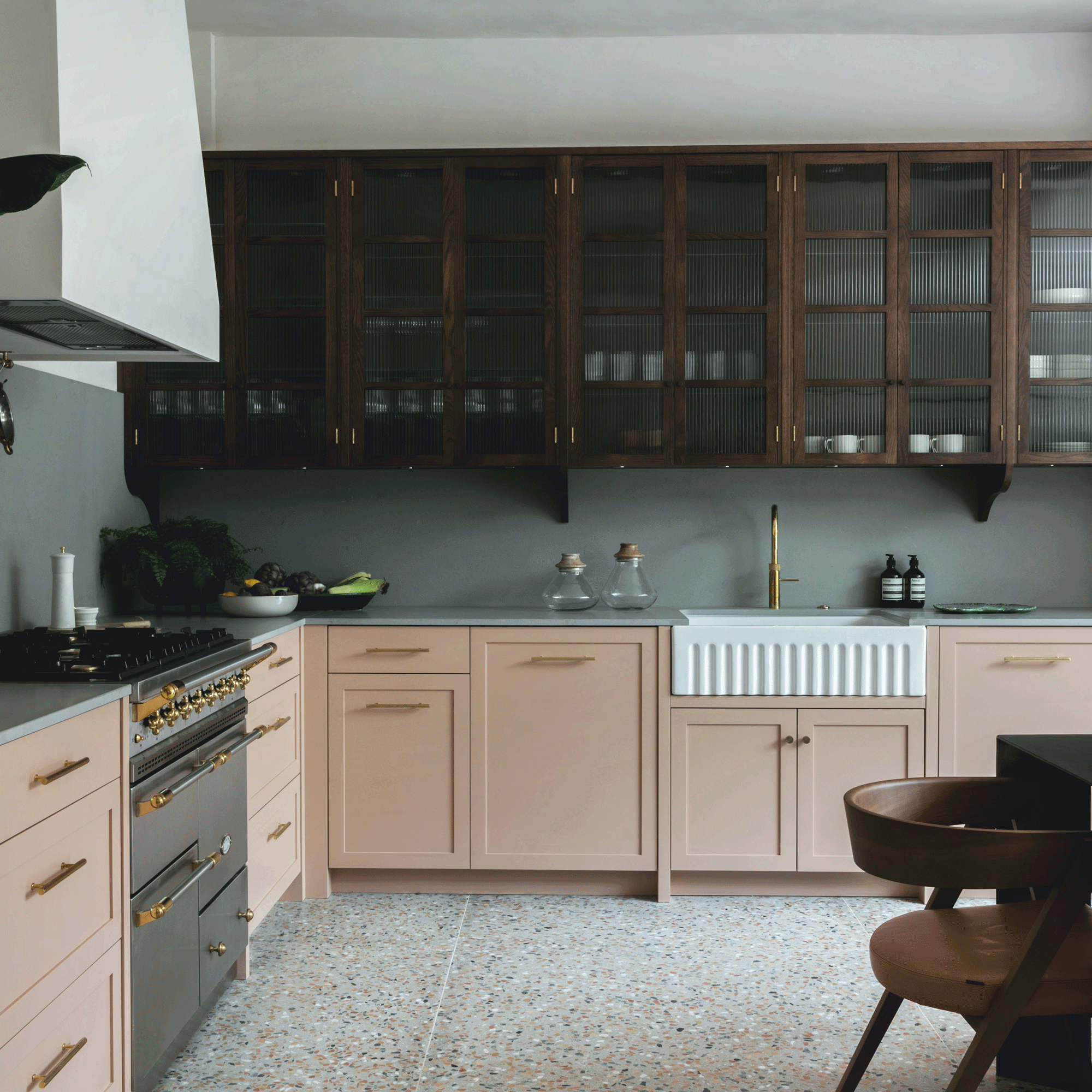
Terrazzo flooring has seen a resurgence in popularity over the last few years because it helps create decorative surfaces that are more interesting than alternative, plainer materials. Terrazzo is a very good choice for flooring in a small kitchen because it can bring in color and pattern without overwhelming the space, particularly if you are already nervous about using color.
"In this London kitchen we loved the warmth of the nude/pink kitchen cabinets against the bespoke terrazzo floor but wanted to add some masculinity and impact with wood wall cabinets," explains Tiffany Duggan, founder, and director of Studio Duggan and TROVE.
13. Add terracotta for natural warmth
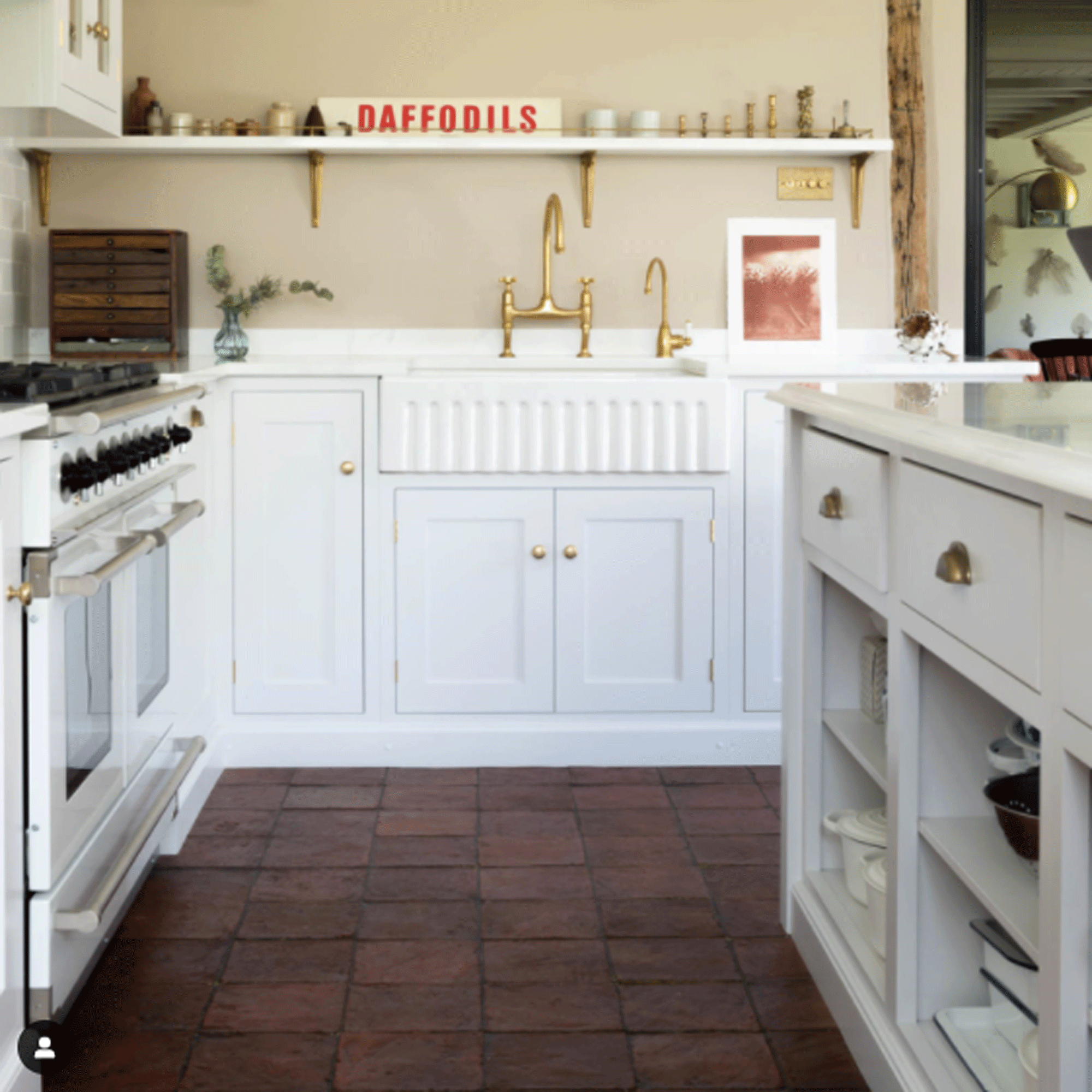
Terracotta tiles may be more associated with rustic kitchens in Mediterranean homes but they can be a fantastic addition to more modern interiors. Not only do they look good and can come in a number of formations, but they are also very durable.
"We recommend terracotta tiles for kitchen customers looking for something timeless and traditional," Kathryn Collins, manager at Floors Of Stone. "The beautiful deep red, russet tones give an instant warmth to a room and work perfectly alongside a simple, shaker kitchen in pale shades such as our linen or damask. Practical, rustic, full of character — no other floor covering looks as authentic as these."
14. Use black and white tiles to visually expand a galley kitchen
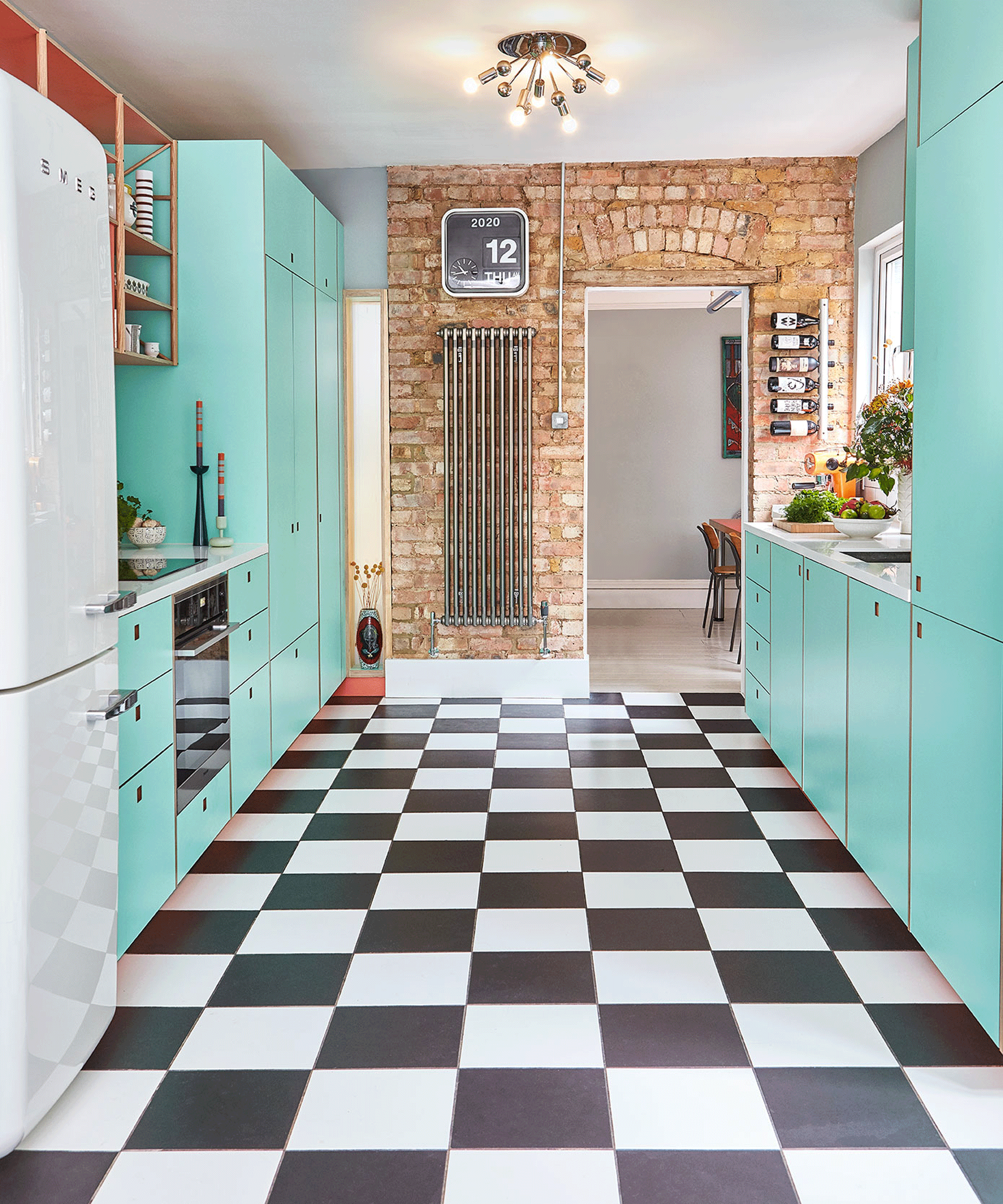
The right tile can make a modern small kitchen look much bigger than it is. The black and white tiles used in this kitchen, designed by Pluck, create the effect of a longer and wider space, making it feel so spacious.
"The floor in a kitchen can be one of the largest surface areas visible in the room which means it should not be an afterthought in your scheme," says Leila Touwen of Pluck. "Color, pattern, natural materials or contrasting hues in your flooring choice will make a big impact on the design and feel of your kitchen, where it should be taken as seriously as decisions over wall color and cabinetry and furniture."
What is the best flooring for a small kitchen?
The best flooring for a small kitchen is a large format grey stone effect porcelain tile — minimal grout joints combined with low tonal variation from tile to tile, provide a sleek modern look and will make a kitchen look bigger.
"If a more classic/traditional style is desired, we often find going with a light-colored tumbled limestone with a grey undertone works well, the hint of grey ties the floor in with the kitchen, and the tumbled edge suggests an aged floor laid for many years," says Isabel Fernandez, director at Quorn Stone. "Opting for a lighter base tone avoids the space becoming dominated by the grey which often produces a more contemporary feel."
What size floor tiles are best for a small kitchen?
Generally, large format tiles are ideal for a small kitchen because not only are they easy to clean but they can also give the space a clean, uncluttered look. Fewer grout lines help to create a boosted visual and distract from the small square footage of the room. Square and rectangular formats aside, you can also go in for hexagon or herringbone bond subway tiles and mosaics to give your kitchen a stand-out quality.
What is the most hard-wearing floor tile for kitchens?
Porcelain tiles are generally considered the most hard-wearing flooring option to use in a kitchen because of their strength, durability, and versatility.
"As well as kitchens, porcelain tiles are great for floors, especially in wet areas like bathrooms, while ceramic tiles are better for walls or areas with less moisture or tread," says Rob Whitaker, creative and product director of Claybrook. "Porcelain tiles can be harder to cut on the whole, and require an experienced tiler with the correct equipment, and some porcelain tiles will also be suitable for outdoor use."







